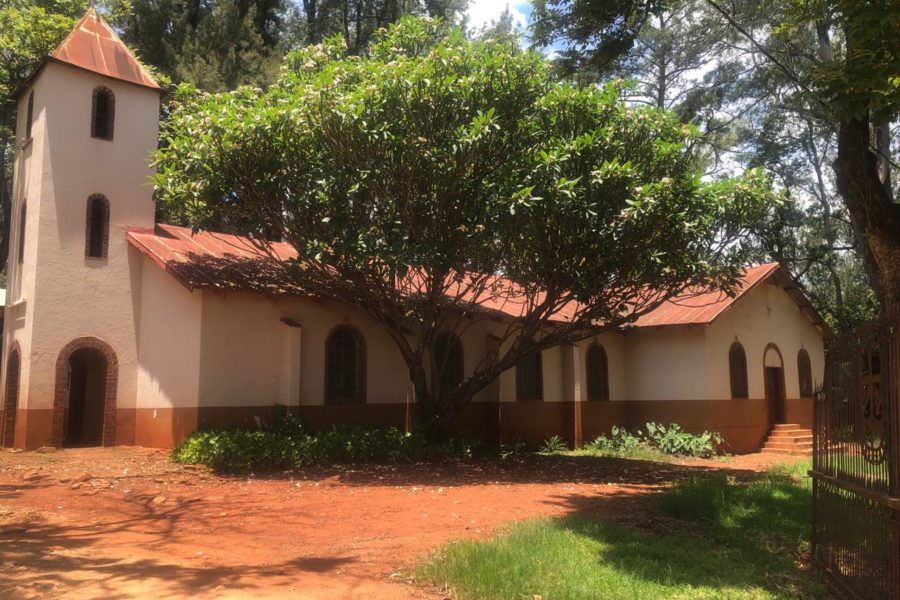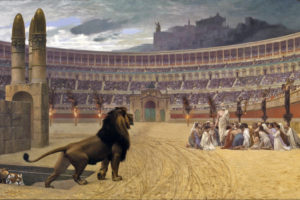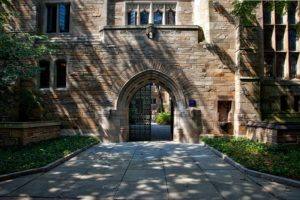What is African Religion all About?
Africa’s traditional worldview and religion is similar to that which was practiced by many people around the globe. It is commonly called animism, which basically means that everything in the world is animated with life by the unseen spirit-world, and that humans should respect these spirits if they wish to live peacefully and harmoniously on earth.
Even some of our parishioners here in St. Catharines told me that their parents still practiced animism in some form back in the day in China or Korea. It was (and often still is) the worldview of many native peoples on both American continents. Animism is also prevalent in folk Islam that is so widespread all over North Africa and the Middle East, and it is very common on the Indian sub-continent too. So animism is by no means an exclusive African phenomenon, though it is in Sub-Saharan Africa where it is still a dominant force in society to be reckoned with.
In a previous blog-post I mentioned that I asked my 25 plus students in Malawi (back in late June 2019) what they thought of African Religion and where they would place its many beliefs in light of what we have learned about worldviews during that week. More in particular, where do they place ATR in light of what the Bible teaches us about God, humankind and the Gospel of His Son? I was curious to know what they thought of their own traditional worldview, since there have been some influential Christian theologians in the past (and are still many lay people in Africa in the present) who would like to compare African Religion to the Old Testament, as some sort of a benign preparatory phase to the coming of Christ and the preaching of the Gospel.
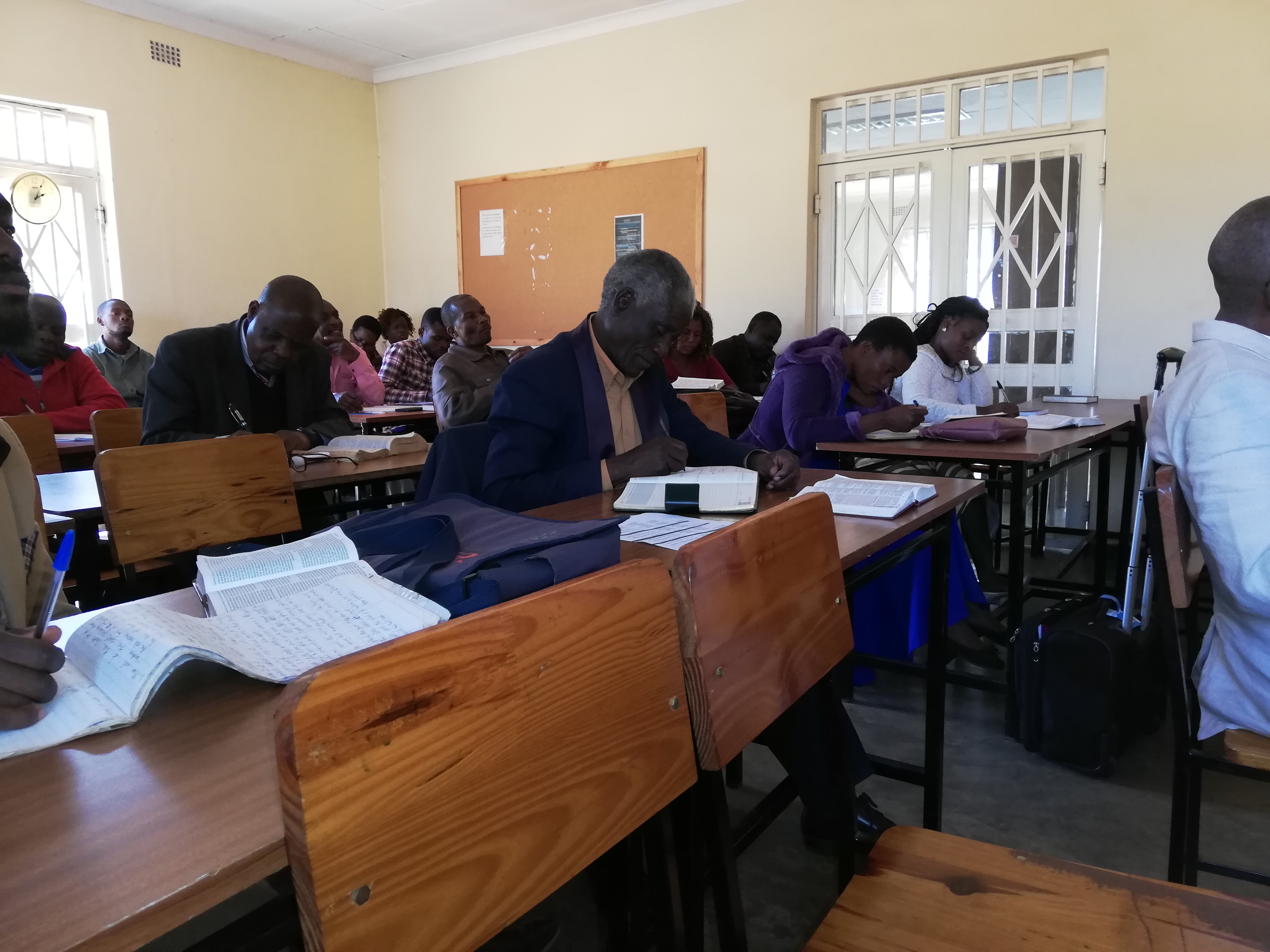
In a nutshell, what are the pros and the cons of ATR? After my students divided into several groups for discussion, they responded through a “representative”. So here is what they said:
Martha’s group said that ATR teaches belief in mediums, in sacrifices and reincarnation, and also that witchcraft is “a gift from God” to protect us from spirits, since it teaches that all suffering is the caused by angry spirits. All this was not mentioned with approval!
Andrea’s group said that witchcraft promotes sexual immorality. It also encourages you to expose yourself in public and to steal from others. It teaches young people to have sex before marriage.
Elijah’s group mentioned that ATR also has a positive dimension in that it cultivates obedience and respect to the elders, and a sense of piety, by teaching you to offer prayers and sacrifices at shrines when praying for rain. It also teaches belief in God. Negatively speaking it teaches that witchcraft is “a gift from God” and that ancestral spirits operate as intermediaries between us and God.
Elijah also spoke about some of the secrets of a prominent cult called Gule Wamkulu. It promotes immorality and magic among the youth. Young people get invited to it secret rituals for initiation, where exorcism is practiced and where some ostensibly receive the power to play with poisonous snakes and set themselves on fire without burning. Christian young people who don’t want to join Gule Wamkulu must literally run away from this cult, since it is considered to be a heritage of the Chichewa people. Christian young people who joined these camps will usually be excommunicated by their congregations if they do not repent.
Samson’s group said that (on the positive side) ATR cultivates a knowledge of spiritual power as well as obedience and respect. Negatively speaking it does not know the true God, but fashions its own gods and teaches us to trust in “good works”. Its gods are not omnipresent, since you can only sacrifice to them at a certain place, and not pray to them anywhere. Only the living God is omnipresent.
Emmanuel’s group said that ATR puts man at the center and not God. It is built on the fear of man, i.e. the fear that the spirit of someone who dies may come and haunt you if you did not obey him or her, or the fear that someone who does not like you might bewitch you. It practices magic openly. ATR instills fear in people that they might not die naturally but through witchcraft. This fear even lives among some (Christian) believers who believe that all good things come from the spirits.
In the Nsanje District of southern Malawi a certain god Mbona is worshipped. Young virgins are said to be devoted him for life, so as to look after his sanctuary and serve him his offerings. It is believed that they get impregnated by Mbona’s spirit when he visits them during the night.
At a previous visit to Malawi my students spoke at length about the phenomenon that female witches are believed to have the ability to leave their bodies and fly (in baskets) to a place where they gather for nocturnal rituals in witchcraft. They have given ample “evidence” for their belief that this actually happens. This is generally believed to happen all over Malawi and beyond.
I was very thankful to my students for their response. They came out unequivocally on the side of the true and living God and His glorious Gospel and against the dark side of Africa’s traditional worldview. In other words, they do not share the liberal optimism about primitive tribes and all their customs that has become so popular since the days of Jean-Jacques Rousseau (1712 -1778) and which has now become the prevailing opinion in the secular West. None of them sought to blur the lines between light and darkness, for the two have nothing in common (II Cor. 6:14). I experienced the same kind of response from my students in Tanzania and Kenya. The Lord Jesus has firmly rooted his Gospel in their hearts and lives through the work of His Holy Spirit!
Let us now briefly look at some of the pros and cons of Africa’s traditional worldview
1. What Africans must always cherish in their own tradition
Much of African tradition is focused on the coherence and peaceful co-existence of the tribe or people group. This is why Ubuntu has become so much celebrated worldwide – a concept individualistic Westerners have much to learn from. One famous saying in Africa goes: “If you want to go fast, you go alone. If you want to go far, we go together”. Ubuntu must be preserved, but not at every cost.
Closely connected with Ubuntu is the warm African hospitality to strangers. Africans have time for their guests and for those who take a real interest in their lives. They should never lose this outstanding quality. Coupled with this goes the virtue of gentle humility and willingness to help, especially where Africans have not yet been influenced by the entitlement-attitude from the West. Growing up as a child during the apartheid years, I observed that it was often black people that pulled off to help white people, when they got stuck at the side of the road.
Secondly, Africans still have respect for their parents, family and elders. During my visits to rural Africa I sometimes wished that my parishioners back in Canada could behold the deference African young people show to their parents and seniors. A Ghanaian proverb says it well: “The elders of a village are its borders”! But again, this deference may never be absolute.
It’s also hard to ignore Africa’s lofty view of marriage and its endearment of children. According to scholar John Mbiti every African young person is raised with the view to be married one day and to have children. In the Congo they say: “Love is like a baby, it needs to be treated tenderly”!
Fourthly there is the close bond between African people and their land. So many African sayings refer to this close bond with nature, for instance: “When two elephants fight, it is the grass that gets trampled”. Africans learn from its amazing animals, the changing of their seasons, from the starry night, the savanna landscape and everything else.
Fifthly it is hard not to be carried away by the spontaneous way Africans worship. Christians who have visited Africa invariably speak with great excitement about their experience in worship. And African Christians do not only worship in church! How shall I ever forget being awakened every morning by the hymn-singing of my Chichewa brothers at 5:30 am, as they washed themselves in preparation for another day’s work in rural Malawi in 2017! It’s an experience beyond words.
Lastly, Africans should make sure that they never catch the awful disease of North American sloppiness. Africans know how to dress neatly and tastefully. They generally also know how to stay in shape better than us here in North America. This is always a delight for the eye when one visits the continent. Moreover, African Christians know that the scarring and painting of your body is part of pagan culture, and not fitting for Christians.
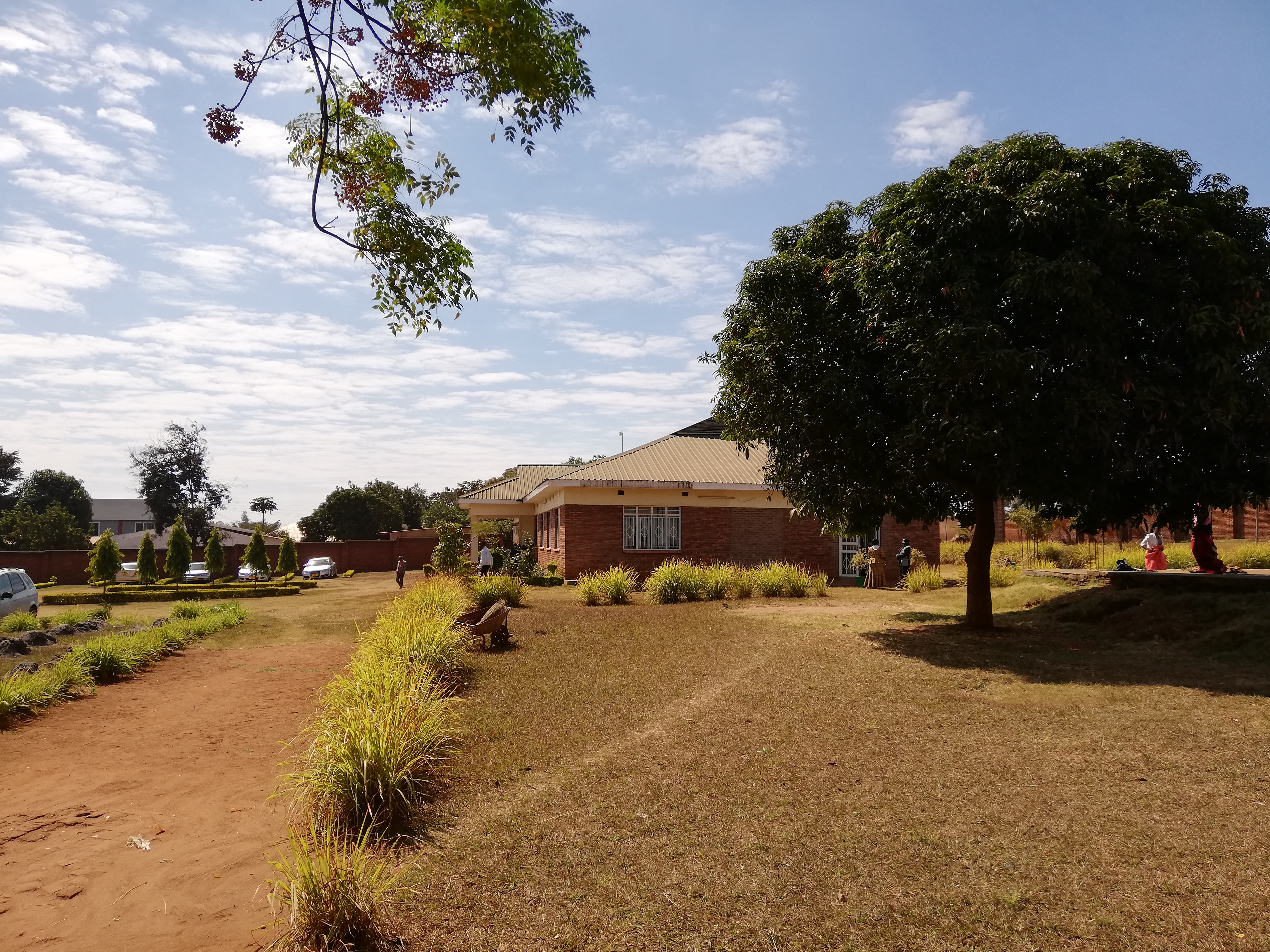
2. What has to change?
There is much that Africans never need to change or be ashamed of when becoming Christians. But there are also things that definitely need to change. The traditional worldview of Africa – as described by many fine authors and theologians, African and otherwise – can simply not endure the light of Scripture on so many crucial points.
First of all one is struck by the fact that there is no sense of divine revelation in ATR. Everything traditional Africa believes religiously comes to us out a hazy, foggy bygone era, with no clear beacons or markers of where God has spoken and revealed himself to mankind. It is therefore also a religion that lacks any sense of an objective moral code, a concept of sin as the transgression of that code, and the need for atonement from sin. Taboos are plenty, but they state what goes against the traditions of the ancestors or against the customs of the tribe. These taboos have however no permanent divine authority, nor do they differentiate right from wrong in an ethical sense.
Secondly, a clear consequence of the entire lack of divine revelation is that absolute authority resides with the king, the chief, the elders and spiritual healers or counselors. Africa prides itself in its reverence for its ancestors and indunas. While respect for one’s leaders and ancestors and love for one’s parents are surely biblical virtues, the same Bible tells us never to condone their sins and failures or to follow their bad examples. This necessary trait for any mature society hoping to flourish, is absent in ATR. There is little room for cultural introspection and correction, if you may in no way oppose your leaders or ancestors.
Dr. Benno van Toren of Groningen has pointed out that the radical distinction in the Judeo-Christian worldview between the Creator and his creation, led to a desacralisation and a relativisation of all human authority in that civilization. Any leader is in principle open to criticism. In fact, that was the primary function of the Hebrew prophets of ancient Israel, to remind the elites of their moral and religious responsibility. The traditional African worldview, resembles the worldview of the Ancient Near East in this respect that there is no clear distinction between creation and God or the gods. That leads to a sacralisation of authority. The king or the chief is the direct representation of the gods and may not be criticized. That’s why in some African cultures the only way for a traditional ruler to be replaced is either by way of death or suicide. To give away power is unheard of in traditional Africa. “Once in power, always in power” is just plain normal for traditional Africa.
One only has to read Nehemiah 9 and Daniel 9 to get a good sense of what ATR is preventing from happening. Nehemiah confesses publicly, on behalf of all the people in verse 16, “our fathers acted presumptuously, and stiffened their neck and did not obey your commandments”. Again in verse 26 he says “they were disobedient and rebelled against you, and cast your law behind their back and killed your prophets”. He repeats this many times until he comes in verse 26 to the heartbreaking admission before God: “Behold we are slaves this day in the land that you gave our fathers to enjoy…” Daniel cries out in 9:8: “To us Lord belongs open shame, to our kings, to our princes, to our fathers, because we have sinned against you”.
Are Africans free to pray like this publicly and privately? Or does ATR prohibit them from doing so? Do we realize how our parents deeds or misdeeds can bring us into slavery, for whatever one generation tolerates, the next one will embrace. How can any nation move forward with hope, without doing real introspection about is past?
Thirdly, all of this also means that ATR has no real fixed foundation for justice and equity. For justice to flourish, one must have an objective and universally accepted moral code that applies to all. Justice and equity are seriously compromised in African society by the tolerance of witchcraft and the belief in spirits, whereby anyone can virtually at any given moment be accused of anything, without evidence, and where the traditions also change with time.
Fourthly, traditional African culture also lacks a strong sense of history, of the beginning and end of time, as well as a future-looking mindset, which is so crucial for accountability, productivity and sustainable economic growth. Someone once wrote that some African tribes have no word for “future”! Only the Judaeo-Christian worldview is really able to fill this void and transform the continent, if Africans are willing to let go of their animistic worldview.
Lastly, the most serious aberration of African traditional religion no doubt centers on its view of the causes of good and evil in life. It is this whole aspect that opens the door to Africa’s belief in spirits as well as in occult phenomena such as witchcraft, magic and sorcery. One just has to read the chapter headings in F.B. Welbourne’s little book Atoms and Ancestors of 1968 to get the message:
Chapter 3: “Things go wrong – witchcraft and sorcery”
Chapter 4: “Putting things right – diviners and herbalists”!
However, some contextual theologians would like us to believe that African Religion is to Christianity in Africa, what the Old Testament is to the New. Is this true?
In the Old Testament we read much about the God of our fathers, the God of Abraham, Isaac and Jacob, and about animal sacrifices, etc. All of this however has nothing to do with communicating with or appeasing the spirits of the dead. In fact the same is strictly condemned throughout the Bible.
What Africans also sometimes overlook is that pagan Europe was steeped in the typical animistic beliefs and rituals of Africa, before Christianity arrived. These superstitions and practices have gone underground and are now emerging again as some secular Europeans begin to celebrate their pagan past. It is also wrong to think that it is the white man’s religion that criticizes animism. It is the living God who does so, out of love for our souls! It is Moses and the Prophets, Jesus and his apostles, who criticize both the white man and the black man’s religion, and everything that is not according to God’s Word.
Africans traditionally believe in nature spirits, human spirits (the spirits of the ancestors) and ghosts (the spirits of those who died long ago) as the living dead around us. The supreme God, who is more like an impersonal force, is “remote and silent”. Everyday life for an African centers on making sure not to offend these spirits, by doing various things to appease them, like putting food and beer at a shrine at one’s hut, or slaughtering an animal to keep the spirits happy.
According to African scholar John Mbiti these sacrifices may include the blood of animals as well as of humans! Astonishingly Mbiti offers no criticism to the latter in his book Introduction to African Religion (1991)!
Reports on the BBC indicate that the sacrifice of children in Uganda has risen sharply over the last few decades after colonial rule ended. All of this only means one thing: Africans are paralyzed by fear. Fear dominates all of life. Not rational fear for a recognizable threat, but superstitious fear for what a ghost or spirit can do to you.
And yet, what is so amazing about it all, is that these spirits and ghosts are not to be viewed with trepidation, but with respect! They are all part of our community, the living dead. Africa knows no distinction between the natural and the spiritual realms, the living and the dead are one happy family. The spirits, called the “living dead”, who remain with us and are as much part of the community as any living person. But you must make sure to please them and not upset them!
3. The light of Scripture
Compare all of this with Biblical reality. When the disciples saw Jesus coming to them walking on the water, “they thought it was a ghost and cried out, for they all saw him and were terrified.” A ghost was not benign! Jesus spoke to them and said “Take heart, it is I. Do not be afraid” (Mark 6:49-50).
Way back in Moses’ days Israel was forbidden any attempt to communicate with the dead, or to seek any guidance about the future or the unknown from magicians and sorcerers. All of that was strictly verboten and punishable with death. That is what the nations did, which God had vomited out of the land. If Israel went there, they would be the next to be vomited out (see Leviticus 18:24-30).
Moses made it very clear… if anyone claims to speak a word in Yahweh’s name, while he was not commissioned by God, he shall surely die. And how do you know someone was commissioned by God? His word will be according to the Torah and his prophesies and predictions will come out (Deut. 13). That is essentially what Israel’s true prophets did. They called both the king and the people back to the Torah. They did not bring anything new.
So when Israel so shamelessly broke the covenant, by listening to false prophets and by following the nations in their abominations, God not only brought judgment upon them (by “vomiting them out”) but renewed his promise that One would come – a prophet like Moses – to save them.
To him they all had to listen (see Deut. 18:15-22). For everyone that does not listen to him, will and must be cut off from God’s people. This promise was ultimately fulfilled in Yeshuah (Jesus). That was the message of all the apostles according to Luke (see Acts 3:17-26). So everyone who does not listen to him, Jesus Christ, as he speaks to us Himself and through all his New Testament apostles, will be cut off from God, from his people and from his eternal glory.
4. No compromise, for light and darkness have nothing in common
If African Christians choose to compromise with its traditional beliefs in ghosts and spirits, and all the paranormal paraphernalia that goes along with it, they are basically cutting themselves off from Jesus and his apostles, from the Holy Spirit’s power, from God’s blessings for humanity, and the glorious new creation.
It is here that the Gospel must do its deepest work to set all African spiritual prisoners free in Christ. That some African “Christians” are so nonchalant with regards to the dark side of their ancestors’ traditions, is simply incomprehensible from a Biblical perspective. The one command given more than any other in Scripture is: Do not fear! African Religion thrives on fear… for humans and spirits. The one book in the Bible where the command not to fear sounds more than anywhere else – Isaiah – is also filled with a full-scale attack against the Babylonian religion that became such a snare to Israel. Why? With its peeping spirits, astrologers, sorcerers and witchcraft this fake religion taught Israel to fear man and the spirit-world. The prophet mocks them again and again, challenging them to predict the future as only Yahweh can (see Isaiah 46-48).
God Almighty, says Isaiah, has no delight in us “drawing near with our mouths, and honoring him with our lips, while our hearts are far away from him” (cf. Is. 29:13). Our faith and worship must be real and without compromise. “The Lord of hosts, Him you shall hallow, let Him be your fear, and let Him be your dread” (Is. 8:13 NKJV). Therefore, “In returning and rest you shall be saved, in quietness and confidence shall be your strength” (Is. 30:15 NKJV). African Christians shall never be established, if they waver between two opinions, between that of Biblical Christianity and of African Traditional Religion. It is either the one or the other. It is either Christ or the spirits. It can never be both.
And what is true for Africa, is true for Christianity everywhere, also in the West. In the West the church has feared confrontation with our secular-humanist culture for the last century, and Christianity is dying. The same will happen to African Christianity, unless she is willing to face the reality of confronting a hostile worldview.
A seasoned African journalist from Zambia, Samuel Ngoma is correct when he writes: …there is no (Biblical) basis for ancestral worship in Africa. The worship of ancestors is an abomination before God. It grievously offends God and grieves his Holy Spirit.”
This irrational fear, together with tribalism, are the main factors that prevent the entire continent from rising out of its poverty, corruption, and darkness. The Good News is, that when the Son sets us free, we will be free indeed! And while that is often a battle that takes time, it is required of us is that we be absolutely committed to Him by “abiding in his word”. For if we abide in Jesus’ words, we will be truly his disciples, and we will know the truth, and the truth will set us free. May that be, by God’s grace, the abiding testimony of every Christian on the African continent.
Pictures
- The Lutheran church building my great grandfather’s congregation built among the Venda
2. Some of my students at the Logos Institute in Lilongwe
3. The Logos Institute building in Lilongwe, Malawi

